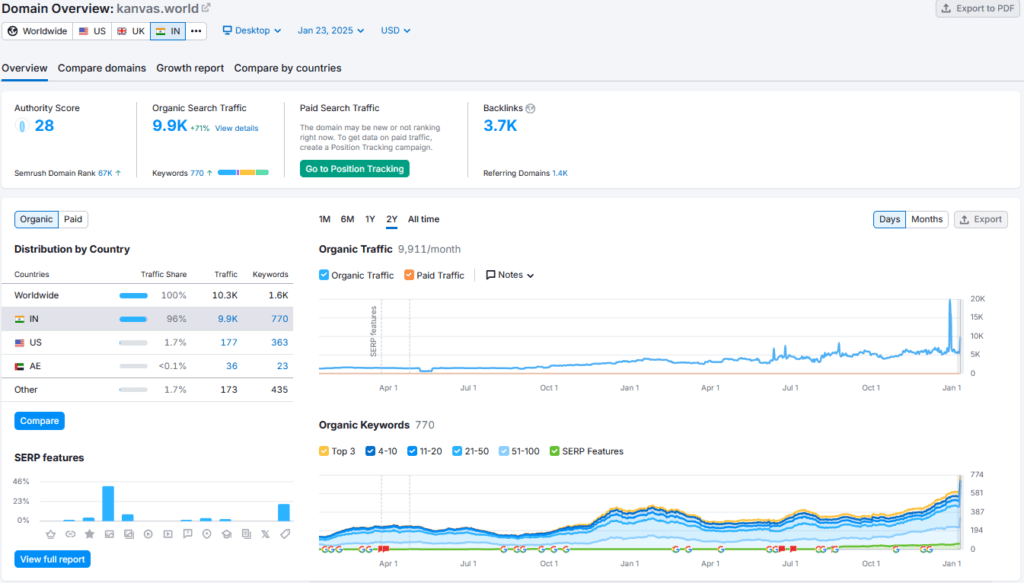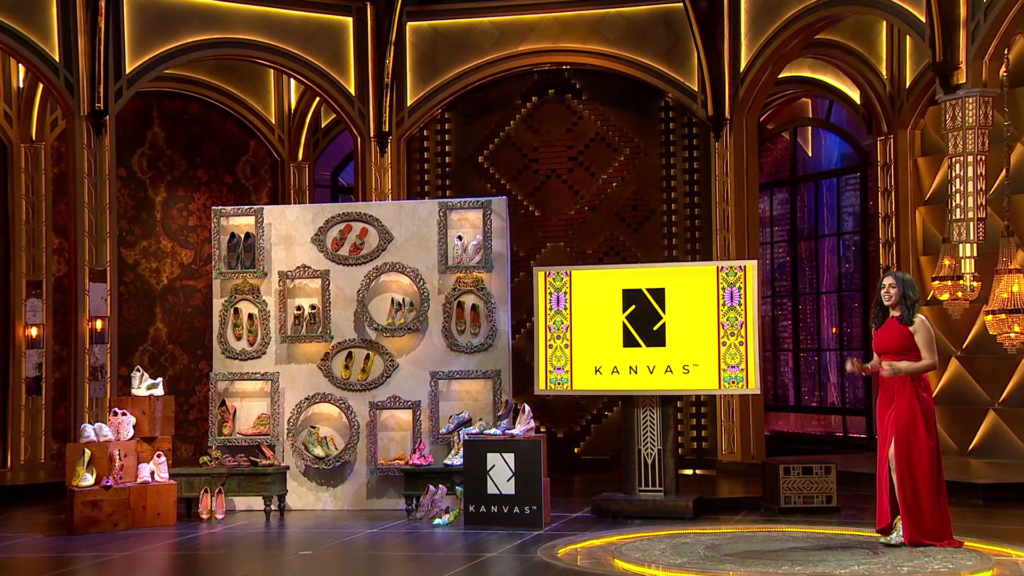Kanvas Shark Tank India Episode Review
Website Information
- Website:- Kanvas
- Build on E-commerce Shopify
- Good SEO Performance but SEO improvement is needed.
- ORGANIC TRAFFIC: 9.9K visitors per month.
Founders
- Kanvas was co-founded by Komal Panchal, who combined her lifelong passion for art and footwear to create a unique lifestyle brand.
- Her vision is to celebrate Indian art forms through fashionable footwear, making them accessible to a broader audience.

Brand Overview
- Kanvas is a lifestyle brand that specializes in producing unique shoes inspired by various Indian art forms.
- The brand aims to merge traditional artistry with contemporary fashion, offering products that not only serve as footwear but also as a medium to showcase cultural heritage.
- Each pair of shoes is designed to reflect the rich artistic traditions of India, with an average price point of ₹4,000.
Shark Tank India Appearance & Ask
- During their appearance on Shark Tank India, Komal sought an investment of ₹60 lakh for 6% equity, valuing the company at ₹10 crore.
- She presented her innovative designs and emphasized the importance of promoting Indian art through her products.
Season and Episode Air Date
- Season: 04
- Episode: 13
- Episode Air Date: Wednesday, 22 January 2025
Product Overview
Kanvas offers a range of footwear products that celebrate Indian art:
- Art-Inspired Shoes: Unique designs that incorporate traditional Indian art forms.
- Seasonal Releases: New designs are launched each season to keep the collection fresh and relevant.
- Customization Options: Customers can request personalized designs tailored to their preferences.
Investor Reactions
Investor reactions during the pitch were mixed:
- Namita Thapar: Expressed concerns about the potential for repeat purchases due to design similarities.
- Anupam Mittal: Asked probing questions about the brand’s purpose and profitability.
- Ritesh Agarwal: Acknowledged the potential but highlighted the challenges in scaling within the competitive footwear market.
Customer Engagement Philosophy
Kanvas engages its customers through various strategies:
- Community Building: Fostering a community around Indian art and craftsmanship.
- Feedback Mechanisms: Actively seeking customer feedback to improve product offerings.
- Social Media Presence: Utilizing platforms like Instagram to showcase designs and engage with customers.
Product Highlights
Key highlights of Kanvas’s offerings include:
- Unique Artistry: Each shoe design reflects traditional Indian art, making them unique pieces.
- Cultural Significance: Products are not just footwear; they tell stories about India’s rich heritage.
- Quality Craftsmanship: Emphasis on high-quality materials and craftsmanship ensures durability.
Future Vision
Komal aims to expand Kanvas’s reach beyond its current market while continuing to innovate within the footwear industry. Her vision includes:
- Increasing brand visibility through strategic marketing efforts.
- Expanding product lines to include accessories that complement the footwear collection.
- Collaborating with artisans across India to preserve and promote traditional crafts.
Deal Finalized or Not
- The deal was not finalized due to concerns raised by the sharks regarding the brand’s growth and product differentiation.
- Initially, Namita Thapar questioned whether customers would buy multiple pairs given the similarity in designs.
- After discussions, the sharks made offers, but ultimately, Komal left without securing a deal.

| Category | Details |
|---|---|
| Website Information | Website: Kanvas |
| Platform: E-commerce Shopify | |
| SEO Performance: Good (9.9K organic visitors/month), but improvement needed | |
| Founders | Founder: Komal Panchal |
| Background: Passionate about art and footwear; aims to combine Indian art forms with modern fashion | |
| Brand Overview | Industry: Lifestyle and artisanal footwear |
| Focus: Unique footwear inspired by Indian art forms | |
| Price Point: Average ₹4,000 | |
| Mission: Celebrate Indian art and make it accessible through fashion | |
| Shark Tank India Appearance | Season: 04 |
| Episode: 13 | |
| Air Date: Wednesday, 22 January 2025 | |
| Investment Ask: ₹60 lakh for 6% equity, valuing the company at ₹10 crore | |
| Product Overview | Offerings: Art-inspired shoes, seasonal collections, customization options |
| Key Features: Designs based on traditional Indian art, durable materials, cultural storytelling | |
| Investor Reactions | Namita Thapar: Concerned about repeat purchases due to design similarity |
| Anupam Mittal: Focused on brand’s purpose and profitability | |
| Ritesh Agarwal: Highlighted challenges in scaling within a competitive footwear market | |
| Deal Finalized | Outcome: No deal finalized due to concerns over growth and product differentiation |
| Customer Engagement | Philosophy: Community building around art and craftsmanship, customer feedback, and active social media presence |
| Product Highlights | Unique Artistry: Designs inspired by traditional Indian art |
| Cultural Significance: Products convey India’s heritage through fashion | |
| High Quality: Focus on craftsmanship and durable materials | |
| Future Vision | Goals: Expand market reach, diversify product lines, and collaborate with artisans |
| Expansion: Plans to enter new markets and create complementary accessories | |
| Business Potential in India | Market Size: Indian footwear market projected to grow from ₹15.1 billion in 2022 to ₹45 billion by 2031 |
| Drivers: Demand for artisanal goods, growing disposable incomes, and interest in sustainable fashion | |
| Total Addressable Market (TAM) | TAM: ₹3,000 Crores ($360M) for artistic and artisanal footwear in urban centers |
| Ideal Target Audience | Target Audience: Art and culture enthusiasts aged 18-40, urban residents |
| Demographics: Middle to upper-middle-class households with disposable income | |
| Focus Cities: Delhi, Mumbai, Bengaluru, Chennai | |
| Marketing Strategy | Brand Positioning: Premium artisanal footwear celebrating Indian heritage |
| Channels: Digital platforms like Instagram and Pinterest, partnerships with artisans | |
| Campaigns: Limited-edition collaborations with local artists | |
| Content & Digital Strategy | SEO Optimization: Increase organic traffic beyond the current 9.9K visitors/month |
| Content Creation: Blog posts on Indian art, styling tips, and customer stories | |
| Social Media: Showcase design process, behind-the-scenes content, and user-generated campaigns | |
| Distribution Strategy | E-commerce through Shopify, Amazon, and Flipkart; partnerships with boutique stores specializing in artisanal goods |
| Advantages | Unique Offering: Culturally inspired footwear blends art and fashion |
| Cultural Relevance: Tells a story through each design | |
| Sustainability: Aligns with growing interest in sustainable and handcrafted goods | |
| Challenges | Competition Risk: Competing with established brands |
| Market Education: Requires consumer awareness about artisanal products’ value | |
| Scaling Production: Balancing quality and scaling manufacturing processes | |
| Mitigation Strategies | Rebranding: Develop distinct, innovative designs to stand out |
| Market Research: Regularly adapt to customer trends and preferences | |
| Quality Control: Ensure consistency and durability in products | |
| Roadmap to Increase Valuation | 2025: Digital marketing campaigns to enhance brand visibility |
| 2026: Expand operations to neighboring states | |
| 2027: Diversify into accessories that complement the footwear collection | |
| 2028: Collaborate with boutiques and marketplaces for greater reach | |
| Valuation Goal | Solidify Kanvas as a niche premium lifestyle brand while preserving its cultural significance |
Kanvas Shark Tank India Business Plan

Business Potential in India
- The Indian footwear market was valued at approximately ₹15.1 billion in 2022 and is projected to grow at a CAGR of 12.9%, reaching ₹45 billion by 2031.
- The demand for unique and culturally significant footwear is rising due to increasing disposable incomes and changing consumer preferences towards artisanal products.
- With the growing interest in sustainable and handcrafted goods, Kanvas is well-positioned to capture a niche market.
Total Addressable Market (TAM)
- The total addressable market for artistic and artisanal footwear in India is estimated at around ₹3,000 Crores ($360 million), focusing on urban centers where demand for unique fashion products is higher.
- Kanvas can target a substantial share of this market by emphasizing its cultural significance and craftsmanship.
Ideal Target Audience and Demographics
- Target Audience: Fashion-conscious individuals who appreciate art and culture, particularly those aged 18-40.
- Demographics:
- Urban residents in metropolitan cities like Delhi, Mumbai, Bengaluru, and Chennai.
- Middle to upper-middle-class households with disposable income.
- Individuals interested in sustainable fashion and supporting local artisans.
Marketing Strategy
- Brand Positioning: Position Kanvas as a premium lifestyle brand that celebrates Indian art through innovative footwear.
- Channels: Focus on digital marketing channels, particularly social media platforms like Instagram and Pinterest, to effectively reach the target audience.
- Collaborations: Partner with local artisans and artists to create limited-edition collections that highlight traditional crafts.
Content and Digital Marketing Strategy
- SEO Optimization: Improve website SEO performance to increase organic traffic from the current 9.9K visitors per month.
- Content Creation: Develop engaging content such as blog posts about the significance of different art forms, styling tips for shoes, and customer stories.
- Social Media Engagement: Utilize social media for product showcases, behind-the-scenes content on the design process, and interactive campaigns encouraging user-generated content.
Distribution Strategy
- Launch through e-commerce platforms like Amazon and Flipkart alongside direct sales via the official Kanvas website built on Shopify.
- Explore partnerships with boutique stores specializing in artisanal products to increase visibility in physical retail spaces.
Advantages
- Unique Product Offering: Kanvas provides a distinctive blend of culture and fashion that sets it apart from mass-produced footwear brands.
- Cultural Relevance: Each design tells a story about India’s rich heritage, appealing to consumers looking for meaningful products.
- Growing Market Demand: The increasing trend towards sustainable and artisanal goods positions Kanvas favorably within the growing market.
Challenges
- Competition Risk: Established brands may dominate the market, making it difficult for newcomers like Kanvas to gain traction.
- Market Education: Educating consumers about the value of artisanal products over mass-produced alternatives requires significant marketing efforts.
- Scaling Production: Maintaining quality while scaling production could pose challenges as demand increases.
Reasons for Potential Success
- The rise in consumer awareness regarding sustainability and local craftsmanship aligns with Kanvas’s mission.
- Komal’s personal passion for art resonates well with consumers seeking authenticity in their purchases.
Mitigation Strategies
- Rebranding: Develop unique designs that differentiate Kanvas’s products from competitors to avoid legal issues related to trademark infringement.
- Market Research: Conduct regular research to understand consumer preferences better and adapt offerings accordingly.
- Quality Assurance: Implement stringent quality control measures to ensure product safety and efficacy.
Future Business Vision
Komal aims to expand Kanvas’s reach beyond its current market while continuing to innovate within the footwear industry. Her vision includes:
- Increasing brand visibility through strategic marketing efforts.
- Expanding product lines to include accessories that complement the footwear collection.
- Collaborating with artisans across India to preserve and promote traditional crafts.
Roadmap to Increase Valuation
- Brand Development (2025):
- Launch nationwide campaigns highlighting Kanvas’s unique offerings through digital platforms.
- Geographic Expansion (2026):
- Expand operations into neighboring states beyond Maharashtra where demand exists.
- Product Diversification (2027):
- Introduce new categories of accessories tailored to specific user needs.
- Strategic Partnerships (2028):
- Collaborate with boutiques or online marketplaces focused on artisanal products for increased reach.
Through these strategic initiatives, Kanvas aims to solidify its position as a leading player in India’s artisanal footwear market while enhancing its valuation over time.
Summary
Komal Panchal’s Kanvas bridges the gap between traditional Indian art and contemporary footwear. While challenges such as market education and competition exist, the rising demand for artisanal goods and sustainable fashion provides a strong foundation for success. Through strategic marketing, collaborations, and product diversification, Kanvas has the potential to carve out a unique space in India’s growing footwear market.





Kanvas Shark Tank India Episode Review